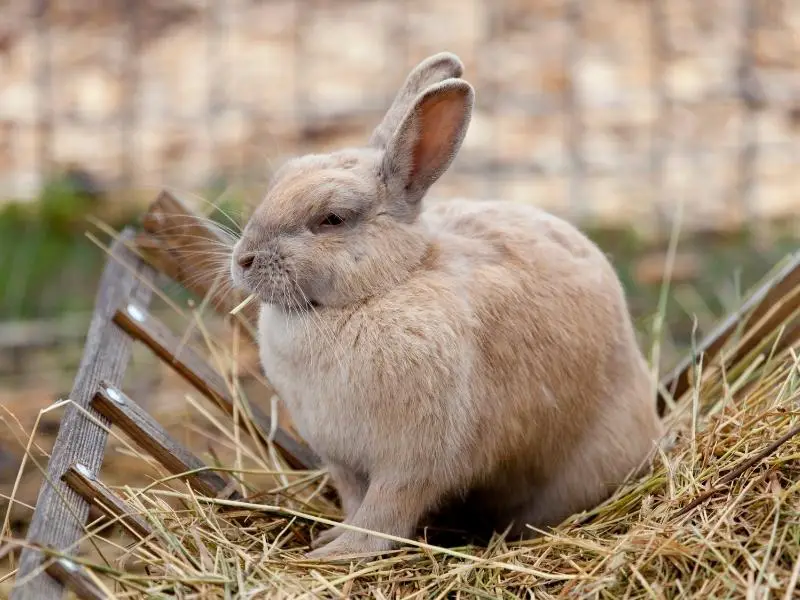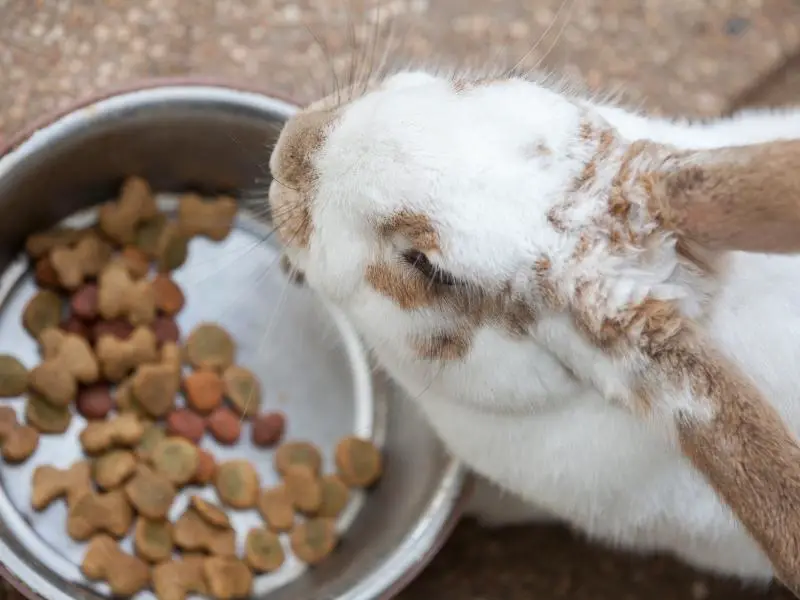Rabbits are opportunistic eaters, and if your hamburger or steak smells interesting, you can bet your bunny will beg for a taste or two. Or maybe your bun stole a bite of steak already when you weren’t looking. So do rabbits eat meat, and more importantly, should they?
Rabbits don’t eat meat as part of their daily diet or when it’s treat time. Bunnies also shouldn’t eat meat because their digestive system isn’t designed to digest animal protein. If a rabbit eats meat (even a small amount), it can sicken, have diarrhea, or die.
Let’s look at why rabbits shouldn’t eat meat and why they don’t eat meat in their diet.
Is It Okay for Rabbits to Eat Meat?
It isn’t okay for rabbits to eat meat. Rabbits are herbivores, and their digestive system can only digest lots of fiber and minimal protein, which needs to be from plant-based sources.
Some mother rabbits do eat their young, but cannibalism among rabbits isn’t the norm.
Rabbits don’t always know what’s good for them to eat, and your steak may smell yummy or interesting. So your bun can beg you for a bite or steal a few bites off your plate when you aren’t looking.
It’s essential to never give in to a begging rabbit when they want a taste of your meat. Keep your rabbit away when you are enjoying your hamburger, steak, or other meat-based meal or snack.
What Happens If a Bunny Eats Meat?
If a rabbit eats a tiny bite of meat, chances are it may be okay. However, it is essential that you keep an eye on your rabbit over the next day or two and make sure they are alright.
If your rabbit develops diarrhea, you need to take your bun to the vet for treatment ASAP.
And if there are any other abnormal changes in your rabbit’s behavior, like a lack of appetite or persistent tummy ache, call your rabbit-savvy vet and book an emergency appointment.
Dangers of Feeding Meat to Rabbits

There are various health risks when your rabbit eats meat:
Can’t Thrive
A rabbit needs a balanced plant-based diet to thrive and grow. If your rabbit eats meat, it means they don’t get the nutrition they need.
Diarrhea
If your bunny unknowingly eats some meat – off your plate because you aren’t going to feed Ms. Fluffles meat, right? – they may suffer from a tummy ache and diarrhea.
You need to call your vet if the diarrhea is severe so they can treat your bunny.
Kidney Damage
Rabbits shouldn’t get too much protein in their diet.
An excess of protein damages a rabbit’s kidneys, and this could be permanent and lead to renal failure (aka kidney failure), which can be fatal.
Digestive Problems
Since a rabbit’s digestive system isn’t made to digest large amounts of protein, eating meat may result in a digestive blockage (or gastrointestinal stasis).
An unbalanced diet will imbalance your rabbit’s gut bacteria, causing bloating and painful gas that causes blockages, organ failure, or even death.
To help your bunny and ensure they get the treatment they need, take your rabbit to the vet immediately.
Uneaten Cecotropes
A rabbit’s body produces nutrient-rich cecotropes that they need to eat to help their body absorb essential nutrients. If your bunny eats a diet that is high in protein, it can stop eating cecotropes.
What Food Can I Feed My Rabbit?
Since your rabbit is a herbivore, its diet should be plant-based.
Here’s a breakdown of what you need to feed your pet rabbit:
Hay
Good-quality hay makes up around 80% of your rabbit’s diet
Your bun needs access to hay all day, every day because it keeps its digestive system moving and helps wear down its ever-growing teeth.
The best type of grass hay for your adult rabbit is Timothy hay. You can occasionally add other types of a hay-like orchard, oat, meadow, fescue, marsh, and herbal hay so your bunny has some variety.
If your bunny is younger than 6 months old, then they should eat alfalfa hay. This hay has the best nutritional content for a young bun to grow.
Pellets
Your rabbit should get two daily servings of pellets a day. Make sure that the pellets you buy are safe for your rabbit – they shouldn’t contain corn, fruity pieces, or anything that’s bad for your bun.
Pellets make up about 5% of your rabbit’s diet.
When buying pellets, ensure there’s 18% or more fiber, 12-14% protein, and 3% or less fat. Check the nutritional label for these values.
Fruit
Fruit should be fed sparingly to your rabbit because it is high in sugar, which isn’t good for your bunny. It can lead to obesity and other serious health problems.
Use fruit to treat your rabbit when you train them.
Fruits that are safe for your rabbit to eat are:
- Kiwi
- Lemons
- Apples
- Mangoes
- Bananas
- Oranges
- Peaches
- Blueberries
- Strawberries
- Plums
- Dragon fruit
Leafy Green Vegetables and Herbs
Give your rabbit 2-3 types of fresh leafy greens to eat twice a day; once early in the morning and once in the early evening. Non-sugary vegetables should make up about 10% of your rabbit’s diet every day.
Some types of leafy greens and herbs to feed your rabbit are:
- Arugula
- Basil
- Mint
- Napa cabbage
- Coriander
- Romaine lettuce
- Red cabbage
- Endive
- Dill
- Dandelion greens
- Butter lettuce
- Carrot tops
- Bok choy
- Sage
- Lemongrass
- Wheatgrass
Vegetables
Unless they are leafy greens, the other kinds of vegetables are too high in calories and should be limited to treats for your rabbit.
Vegetables that are safe to feed to your bun in small quantities are:
- Beetroot
- Okra
- Bean sprouts
- Beet greens
- Bell peppers
- Asparagus
- Kohlrabi
- Pumpkin (and seeds)
- Radishes
- Eggplant
- Summer squash
- Zucchini
Water
Water is an essential part of your rabbit’s diet, and your bunny should have access to fresh drinking water every day.
My Last Bunny Thoughts
When you have a pet bunny, it’s your responsibility to take care of your rabbit. That includes knowing what to feed your rabbit and what to keep them away from.
Meat is definitely one of those big NO foods a rabbit shouldn’t eat. It can be fatal or lead to costly vet treatment when your rabbit gets sick.

